Thirty
Two Short Films About Glenn Gould
1993
Director: Francois Girard
Starring: Colm Feore
How
on earth did I not know about this film before now? How have I existed as a fan of classical
music and not yet seen this movie? How
wonderfully brilliant is this depiction of a classical musician’s relationship
with his craft?
Glenn
Gould’s life (as portrayed by Feore) is examined in episodic nature through,
literally, 32 short films. Gould was a
gifted Canadian concert pianist who retired early from performing live concerts
in order to focus more exclusively on recording and broadcasting. He was an artist in a true sense, and had
many eccentricities, and we are shown these in various ways through the short
films. There are interviews with people
who knew him, dramatizations of certain moments of his life, artistic
interpretations of his work, and absolutely tremendous piano music.
The
32 piece segmentation is in reference to Bach’s Goldberg Variations, piano
music which opens with the aria theme, 30 variations of the theme, then
finishes with a restatement of the aria.
This is precisely what the film does, as it calls the opening and
closing credits “Aria,” and there are 30 short films that fall in between
them. It’s also a clever choice given
that Gould’s career was set in motion by his recording of the Goldberg
Variations. I really enjoy this
structure of the film. Like the Goldberg
Variations, each film or variation is relatively brief, only a few minutes
long, and then we move on. We see many
impressions of Gould, be they actual recollections by those who knew him,
flashes of moments in his life as realized by Feore, or some sort of item,
object, or spiritual idea that interested him.
The theme, if you will, is clearly Gould himself. By presenting many facets of one man, we can
piece together some semblance of the person as a whole in a much more complete
manner than through a traditional biographical story. My problem with typical biopics is that I
never feel I’m getting the complete version of a person; they tend to focus on
only certain events in a person’s life.
I don’t have that problem here; quite the opposite. By presenting so many “disjointed” films that
all deal with
Gould, I leave with a very satisfied feeling as to my understanding of the
artist. Who cares that I missed a
narrative detailing his “major life events” when I’m given a far more
satisfying collage of his personality?
There
are sections of the film I responded to better than others. The first third of the film was utterly
divine, and although still good, I was less entranced with the rest of it. I think that this is because the first third
of the film is the one that deals most directly with Gould’s relationship with
music. There is, of course, music
throughout the film, but the later part of the movie focuses more on Gould’s
eccentricities and interests outside of piano, and these are just fundamentally
less compelling to me.
In
particular, the following sections blew me away: “Forty Five Seconds and a
Chair,” which is exactly what is sounds like – we meet Feore and realize he is
portraying Gould; “Gould Meets Gould,” where Gould interviews himself rather
hysterically; “Hamburg,” in which Gould forces a busy maid to sit and listen to
his recording of Beethoven and she has a transcendent experience; “Variation in
C minor,” a simple animation showing the sound waves of Gould’s playing;
“Practice,” in which Gould runs through a Beethoven sonata entirely in his head
and then lovingly closes the lid on the piano keyboard when he’s finished;
“CD318,” where we hear a Gould recording while seeing the mechanisms of Gould’s
favorite piano as its played; and “Passion According to Glenn Gould,” where
Gould is in a studio listening back to one of his recordings, conducting the
music in his head. Divine is the best
word I can think of to describe these sections.
I grew up playing the clarinet and I was pretty good at it, too, and I
loved it (I’ve been meaning to pick it up and join a community group again). I lost myself in classical music when I
played. It wasn’t about just the notes
on the page, it was about feeling, about raw emotion, about telling a story in
a painfully beautiful way. I’m always
looking for films about music to somehow show me that feeling, but it’s a
difficult one to express. These sections
of Thirty
Two Short Films come the closest I’ve ever seen. That ineffable feeling of passion taking
over, of one’s soul soaring through music, of reaching out and touching the
heavens through sound… this movie gets it.
And it’s a hard feeling to comprehend, let alone communicate.
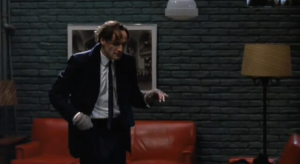 |
| This. This was everything to me. Everything. |
Needless
to say, considering these parts of the film touch me in such a deeply emotional
place, it’s no wonder I’m significantly less moved by the sections that don’t
deal with music. The section where he
writes a funny personal ad is diverting, yes, but not profound like the
others. But, to be fair, this is a movie
about Gould as a whole person, not just Gould as a musician. Personally, I wish it was only about him as a
musician.
And
speaking of which, I had never listened to Gould’s recordings before this
film. I must say I’m intrigued. I am not a huge fan of Bach, not
insignificantly because I’m a clarinetist and the clarinet was invented after
Bach’s time, so there is literally no music by Bach for me to play. I greatly prefer the Romantic era over
Baroque, but Gould’s interpretation of Bach is interesting to me. It’s his articulation that I find most
intriguing. I’ve certainly heard pieces
from, say, “Well-Tempered Clavier” before, but I’ve never heard them the way
Gould plays them. There’s a fascinating
juxtaposition of staccato with legato phrasing that I’m simply not used to
hearing. His interpretation of tempi is
new, too; certain pieces were significantly slower than I was used to hearing,
but it wasn’t a bad thing. It changed
the interpretation of the piece in a novel way.
In all honesty, I’m probably going to head straight to iTunes to
purchase some Bach by Gould because I was that struck by it. And then his Beethoven Sonatas… well, it was
easy for me to understand why the maid in Hamburg had the reaction she
did.
Thirty
Two Short Films About Glenn Gould
is a very interesting portrayal of an artist.
Through these interviews and dramatizations and experimental pieces,
what arises is a clear portrait of a man who was a bit odd but also supremely
gifted. And I have to give it to this
movie, it gets classical music RIGHT; the feeling, the passion, the power. It’s a hard feeling to get, but this movie
touches that spot.
Arbitrary
Rating: 9/10. The sections I mention
were easily 10/10; the others I didn’t, still a solid 8/10. Nine seems a nice compromise. Additional note: I love that Feore is never seen actually playing the piano, in deference to Gould's recordings. It's a nice show of respect to the artist himself. Oh, and I’ve decided I desperately want to
own this on DVD. Gift idea, just FYI. Probably the best new film I’ve seen in
quite some time.
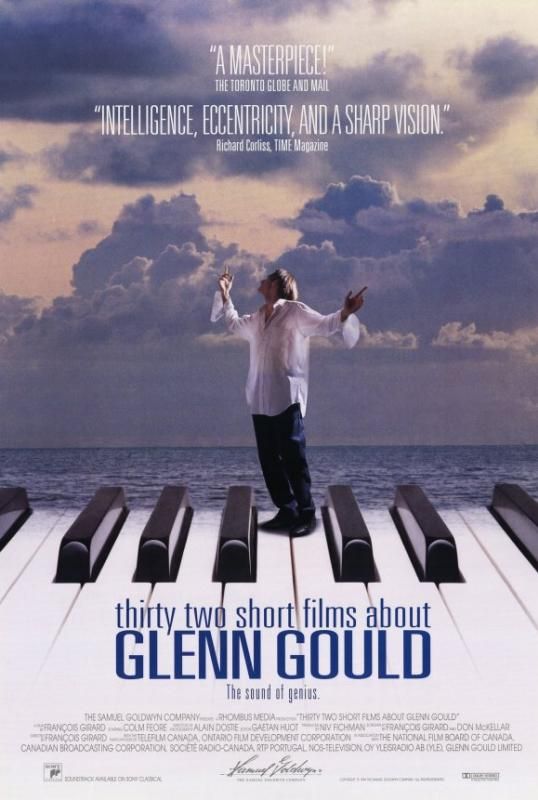
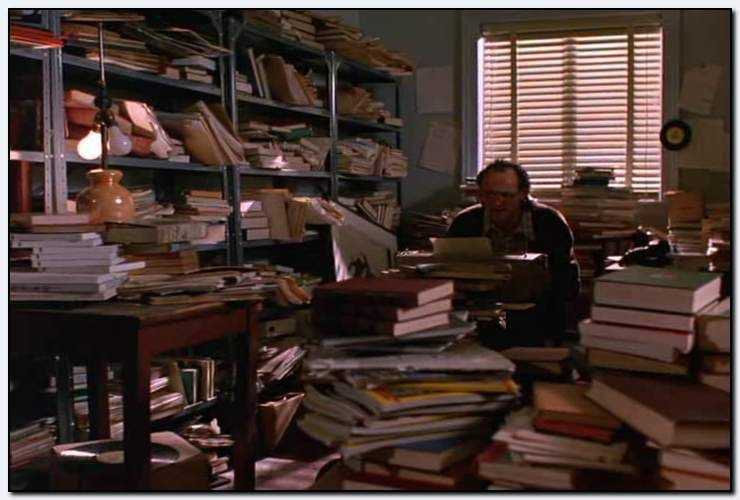
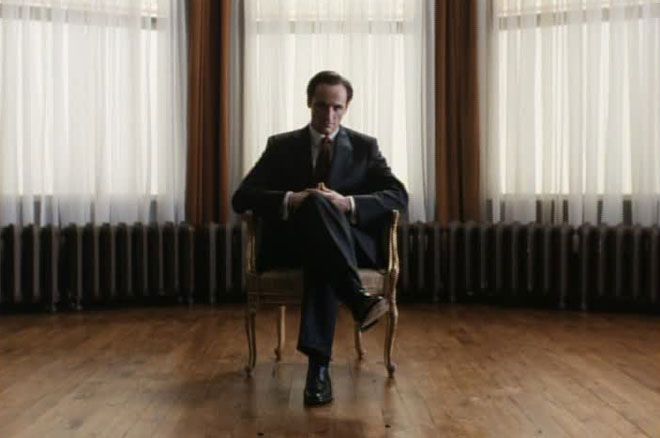
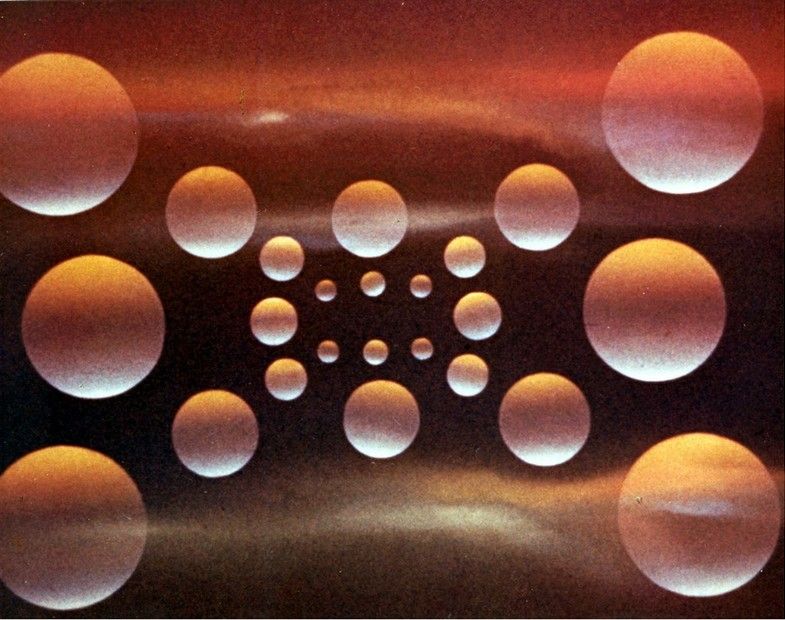
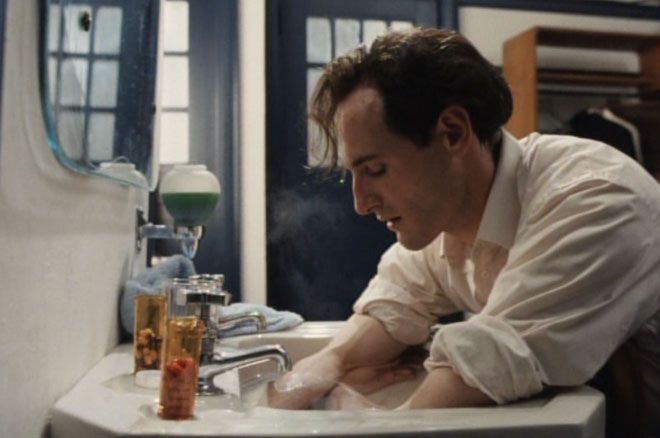
I saw this about 2 years ago as part of my Movies By the Numbers category. I knew nothing about Gould prior to watching the film. I have to disagree on how the presentation works in giving us info on his. I felt I knew little more about him after I got done watching it than I did before I started. That's not a knock because I felt the point of this film is not to tell us about him. Its intended audience is those people who already know who he is and what he does, and the short films are just to pop in and give those people what they expected to see.
ReplyDeleteAn example is one you mentioned about him sitting in a chair. When that piece got done, I just thought, "okaaaaay, moving on." It wasn't until I was reading up about him after the film to actually find out about him that I learned his chair was almost as famous as he was and that was the significance of that short film. Another place I didn't get until I read about him afterwards, but which people who did know him would have immediately understood, are the shorts where they layer multiple soundtracks over each other, sometimes obscuring speech, sometimes obscuring his playing. He got into experimenting with sound over the radio and would just play back overlapping conversations he would record in bars and restaurants.
Overall, I liked this film, but I didn't love it. Because I like space, the bit where we find out one of his recording was put on the Voyager space probe to represent the best of humanity frankly impressed me far more than anything else they showed him doing in the film.
Here is my review, if you are curious: http://tipsfromchip.blogspot.com/2011/11/movie-32-short-films-about-glenn-gould.html
Could not disagree more. I knew absolutely nothing about Glenn Gould before seeing this film, and I felt I gained more insight to him than from nearly any other biopic I can think of. The film spoke volumes to me about Glenn Gould. I guess it just didn't resonate as much with you. To each their own.
DeleteSorry for the long delay in responding, but I've been away from my computer.
DeleteI believe the two of us are using the word "know", as in "to know a person", in different ways (and neither biblically). If I may gender-stereotype for a minute, I believe you mean you felt closer to him as a person - you feel you learned about his hopes, dreams, passions, etc. What I mean by the term is facts about his life, why we were being shown certain people and/or objects, etc. I feel that the scenes rarely explained those things and we were just expected to know them already. 90% of the facts that I now "know" about him I acquired by reading about him afterwards (such as how important his chair was to him.)
'S OK, I knew you were out traipsing around the back woods for a week.
DeleteTrue point about what it means to know someone. I honestly don't give a rat's backside about facts about his life, which is a reason why I tend to get bored very easily by biopics. I feel like if I can look something up on wikipedia about a person, why do I need a movie? The movie should be able to communicate what wikipedia can't, and in this particular biopic, it hit the nail on the head for me.
I think it also GREATLY helped me that, albeit my far inferior amateur status, I have experience performing classical music. There was such tremendous resonance for me in that angle of the piece. I honestly can't think of a film that has better captured what that feels like, at least for me.